This Women's History Month, we're celebrating extraordinary women like Emily Zakem, a microbial ecology at the Carnegie Sciences Biosphere Sciences and Engineering division.
Zakem dives into the intricate web of connections between microbial ecosystems, global biogeochemistry, and the climate system. Her groundbreaking research, rooted in a unique blend of fine arts and environmental science, offers innovative insights into understanding and addressing pressing environmental challenges.
Join us as we explore Zakem's journey and her pioneering contributions to the field of microbial ecology. Stay tuned for more inspiring insights from our Women of Influence series!
Q1: What initially sparked your interest in science?
I was a fine art major in undergrad (drawing and painting), though I also took a lot of other very different kinds of classes because I didn't really know what I wanted to do. Though I really enjoyed my introductory biology class, I never considered science as a career until I took a "Food Systems" class in my third year. It was taught by ecologists, and I was blown away by how these scientists seemed so worldly, talking about how the science they do interfaces with politics, economics, and social justice. I had always thought scientists were only locked away in their laboratories studying some esoteric process! These worldly professors taught me that science could be relevant to the global problems I cared about.
Q2: How do you balance your career as a scientist with your personal life?
I have a small daughter, and I'm not sure balance is the right word. There's never enough time for work, never enough time with her, and no time for anything else. For example, I hardly have time to exercise, which used to be very important to me. Yet, I'm the happiest I've ever been. My partner -- who is also an academic and committed to equal parenting -- and I do a lot of prep on the weekends: grocery shopping and meal planning for the week, cleaning, etc., as well as have much-needed down time and unstructured play time with our daughter. Then we just try to get through the work week with at least a few clean dishes by the end of it.
Q3: Which female scientists have been most inspirational to you?
Susan Solomon: Susan taught a class called "Science, Politics, and Environmental Policy" at MIT, which brought a lot of things together for me at the time and demonstrated that a woman can be a very successful scientist and also well-versed in the broader political and social context. Susan was also a wonderful supporter and mentor to many graduate students outside her research group. In my very male-dominated Ph.D. program, having her as a role model in the department really made a big difference to me in a way that I can't entirely articulate yet, though the word inclusion will be involved when




